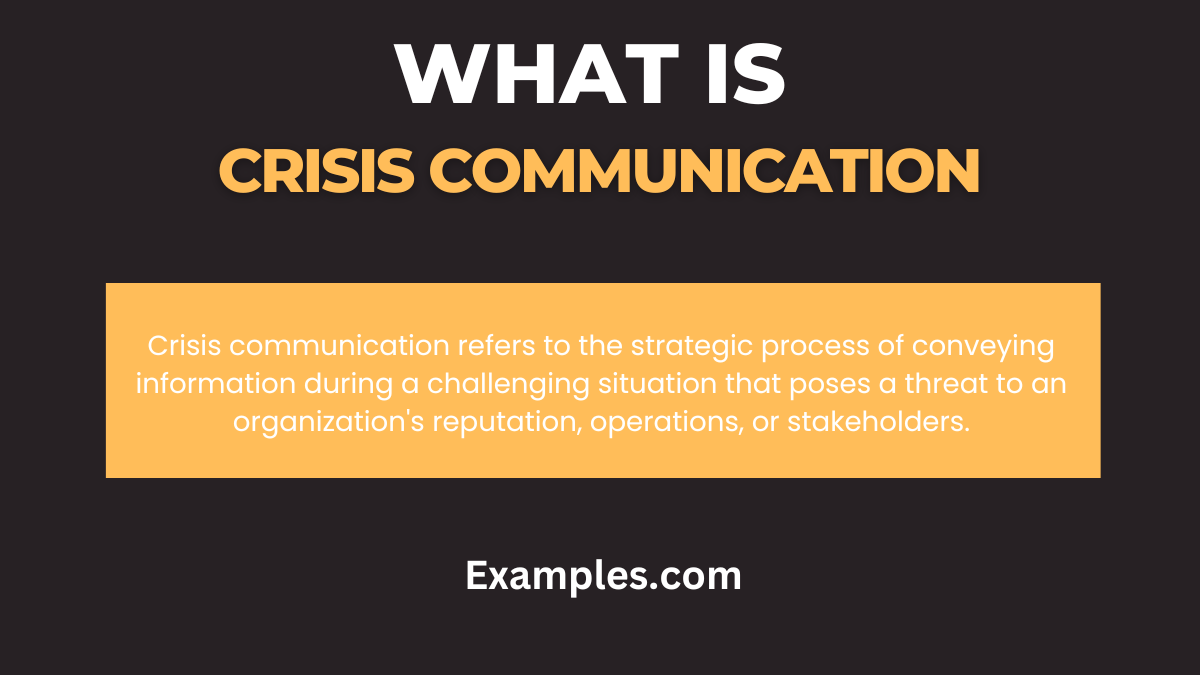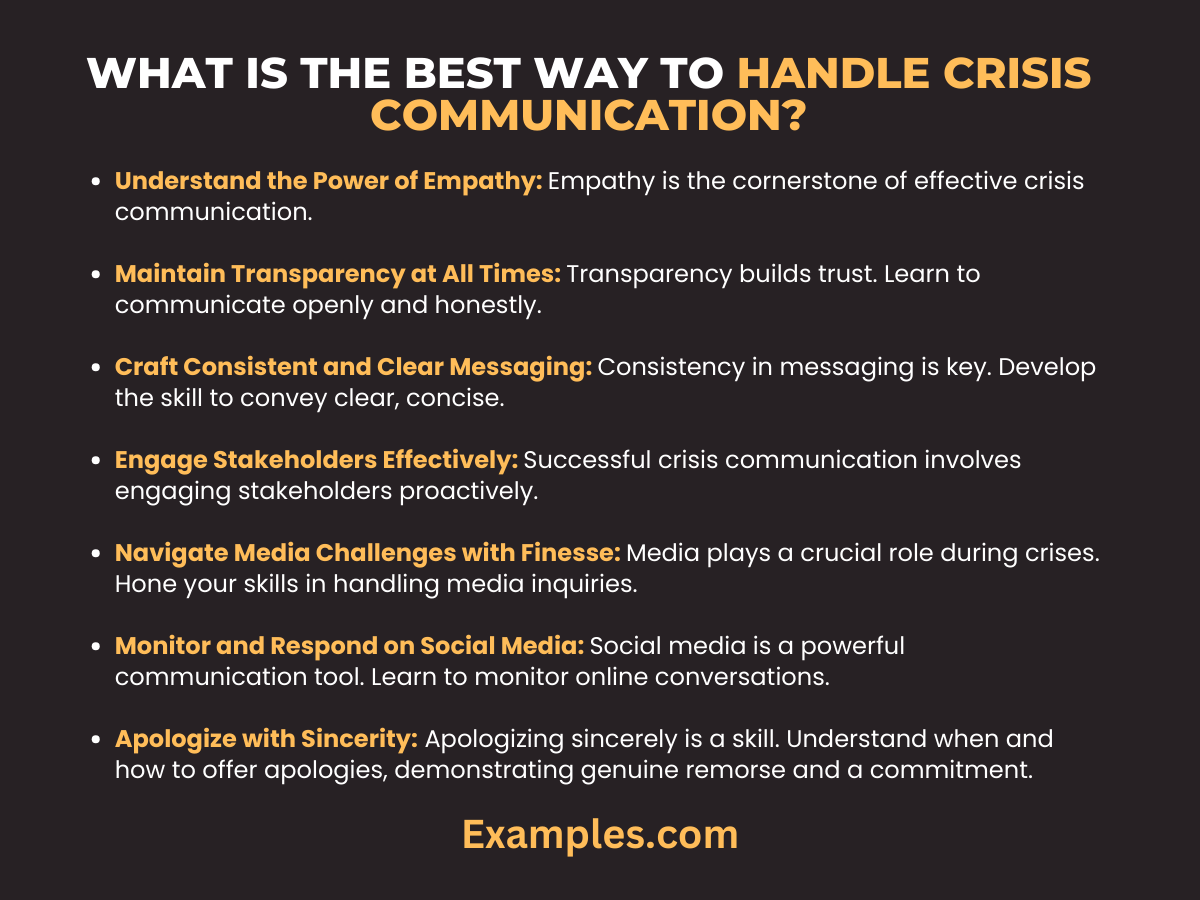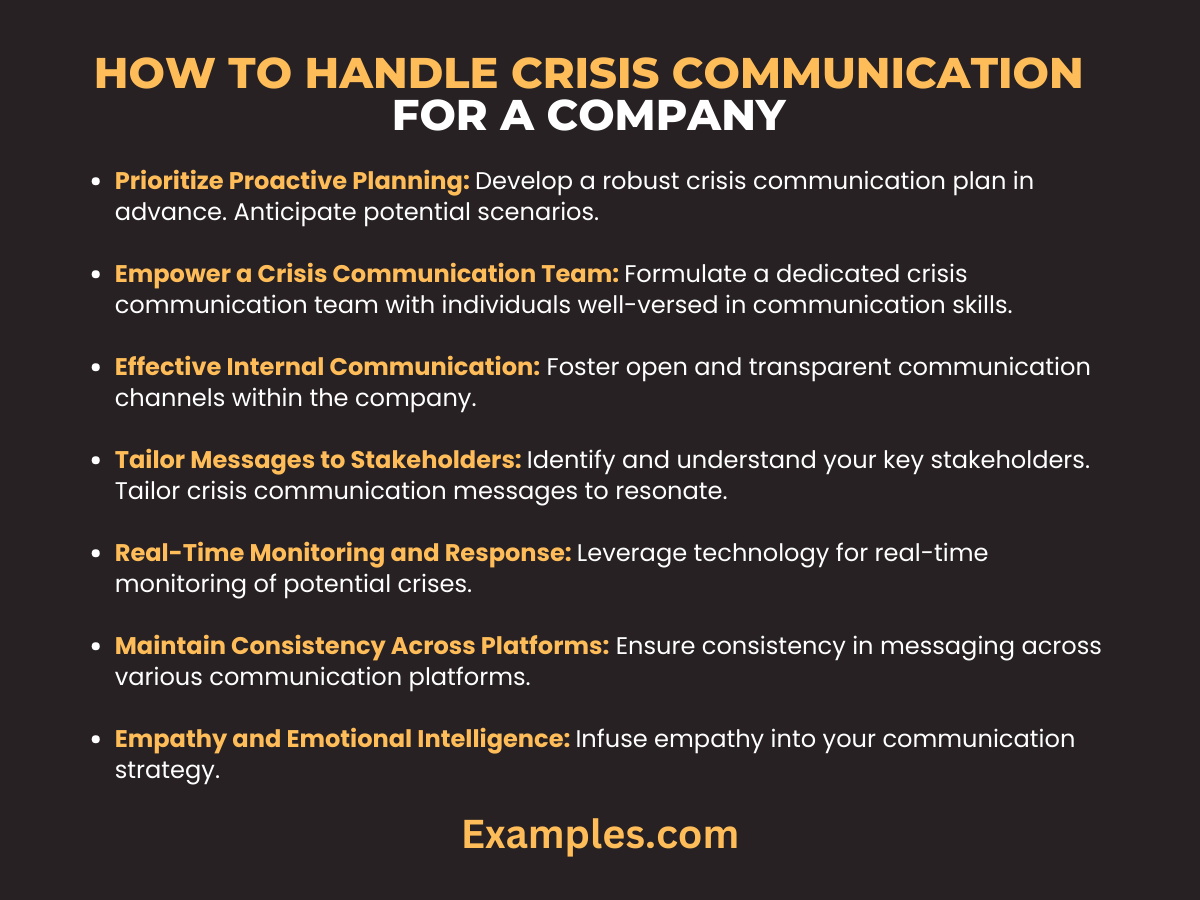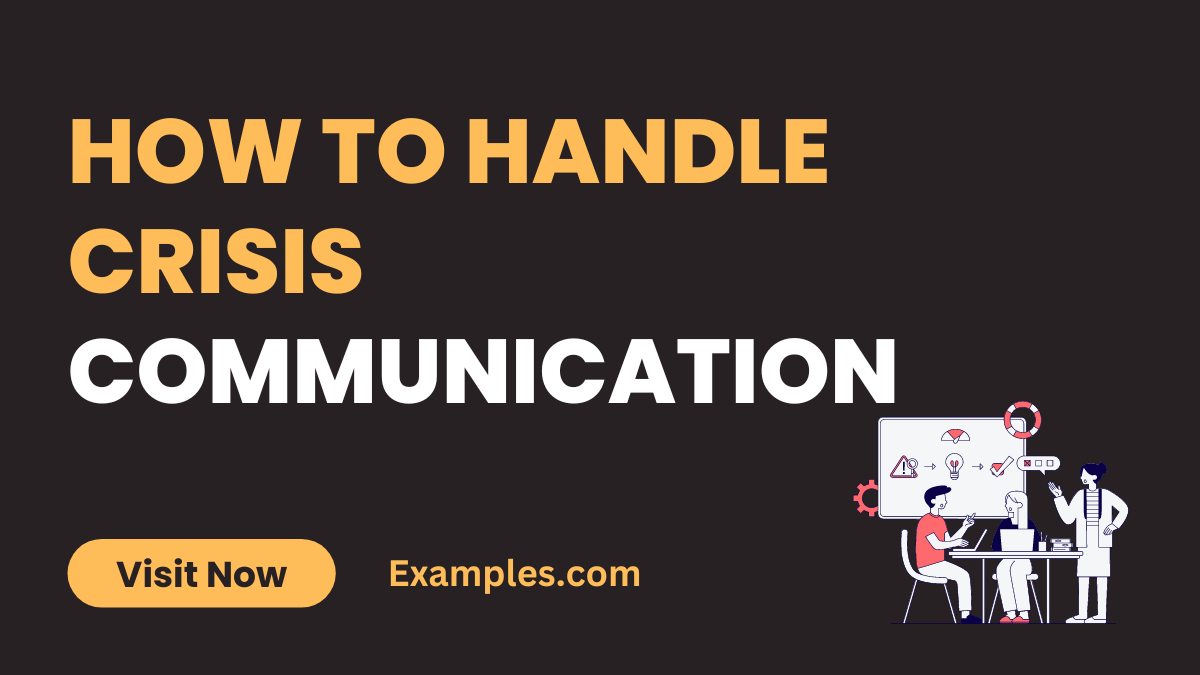How to Handle Crisis Communication
Embark on a journey through the intricacies of crisis communication, exploring its Definition, delving into Origin and History, and uncovering actionable How-tos and Tips. This comprehensive guide equips you with the essential skills to handle crises effectively, offering real-world Examples and strategic insights. Learn to navigate the complexities of crisis communication with confidence, ensuring your organization not only survives challenges but emerges stronger and more resilient.
What is Crisis Communication

Crisis communication refers to the strategic process of conveying information during a challenging situation that poses a threat to an organization’s reputation, operations, or stakeholders. This proactive and reactive communication aims to maintain trust, provide accurate details, and guide appropriate actions, ensuring transparency and effective management of the crisis at hand.
What Is The Best Way To Handle Crisis Communication?

In the dynamic landscape of crisis management, effective communication skills are paramount. Here’s a comprehensive guide on the best way to handle crisis communication, emphasizing the crucial role of communication skills:
- Understand the Power of Empathy: Empathy is the cornerstone of effective crisis communication. Cultivate the ability to understand and share the feelings of those affected, fostering genuine connections.
- Maintain Transparency at All Times: Transparency builds trust. Learn to communicate openly and honestly, providing stakeholders with the information they need to navigate the crisis confidently.
- Craft Consistent and Clear Messaging: Consistency in messaging is key. Develop the skill to convey clear, concise, and consistent information across all communication channels to avoid confusion.
- Engage Stakeholders Effectively: Successful crisis communication involves engaging stakeholders proactively. Develop strategies to keep key audiences informed, involved, and reassured throughout the crisis.
- Navigate Media Challenges with Finesse: Media plays a crucial role during crises. Hone your skills in handling media inquiries, providing accurate information, and shaping the narrative to align with your organization’s goals.
- Monitor and Respond on Social Media: Social media is a powerful communication tool. Learn to monitor online conversations, respond promptly, and manage the digital narrative to protect your organization’s reputation.
- Apologize with Sincerity: Apologizing sincerely is a skill. Understand when and how to offer apologies, demonstrating genuine remorse and a commitment to corrective action.
- Ensure Factual Accuracy: Accuracy is non-negotiable. Develop a rigorous fact-checking process to ensure that all information communicated during a crisis is precise and reliable.
- Preparedness Planning for Communication: Proactive planning is vital. Equip yourself with the skills to develop comprehensive crisis communication plans, ensuring readiness for potential challenges.
- Evaluate and Learn Post-Crisis: After the storm, reflective learning is crucial. Sharpen your skills in post-crisis evaluation, extracting lessons learned and implementing improvements for future crises.
How To Handle Crisis Communication For A Company

In the dynamic corporate landscape, adept crisis communication is paramount for maintaining trust and stability. Here’s a detailed guide on how companies can refine their communication skills to effectively handle crises:
- Prioritize Proactive Planning: Develop a robust crisis communication plan in advance. Anticipate potential scenarios, outline key messages, and designate communication roles within the company.
- Empower a Crisis Communication Team: Formulate a dedicated crisis communication team with individuals well-versed in communication skills. Ensure they undergo regular training to stay prepared for various crisis scenarios.
- Effective Internal Communication: Foster open and transparent communication channels within the company. A well-informed internal team can significantly contribute to the effectiveness of external crisis communication.
- Tailor Messages to Stakeholders: Identify and understand your key stakeholders. Tailor crisis communication messages to resonate with different stakeholder groups, addressing their concerns and expectations.
- Real-Time Monitoring and Response: Leverage technology for real-time monitoring of potential crises. Swiftly respond to emerging situations, demonstrating agility and a proactive approach to communication.
- Maintain Consistency Across Platforms: Ensure consistency in messaging across various communication platforms. From internal memos to public statements, consistency builds credibility during a crisis.
- Empathy and Emotional Intelligence: Infuse empathy into your communication strategy. Understand the emotional impact of a crisis on stakeholders and respond with genuine concern and compassion.
- Clear and Concise Messaging: Practice clear and concise communication. Avoid jargon and deliver messages in a straightforward manner, ensuring they are easily understood by all audiences.
- Social Media Management: Develop social media guidelines for crisis situations. Efficiently manage and respond to social media conversations, addressing concerns and disseminating accurate information.
- Media Relations Mastery: Train key personnel for effective media interactions. Navigate media inquiries with poise, providing accurate information while safeguarding the company’s reputation.
How To Handle Crisis Communication In Business?
In the dynamic landscape of business, crisis communication skills are essential for navigating challenges effectively. Here’s a comprehensive guide on how to handle crisis communication in business, focusing on optimizing communication skills for resilience and success.
- Understanding the Business Landscape in Crisis: To master crisis communication, comprehend the unique challenges and opportunities within your business context. Analyze potential risks, stakeholders, and industry nuances to tailor your communication strategies.
- Developing Proactive Communication Skills: Proactive communication is key. Cultivate skills that enable you to anticipate potential crises, communicate preemptively, and establish a robust foundation for crisis management.
- Building Rapid Response Capabilities: Sharpen your ability to respond swiftly during a crisis. Develop communication skills that facilitate quick decision-making, ensuring timely and effective responses to mitigate negative impacts.
- Embracing Transparent Communication Practices: Transparency is the cornerstone of crisis communication. Hone skills that enable you to communicate openly, providing clear information to stakeholders, customers, and the public, fostering trust.
- Consistent Messaging Across Platforms: Ensure your communication skills extend to maintaining consistency across various platforms. From press releases to social media, proficiency in delivering a cohesive message enhances credibility during a crisis.
- Stakeholder Engagement Strategies: Cultivate skills for engaging stakeholders effectively. Understand their concerns, communicate empathetically, and involve them in the decision-making process, fostering a collaborative approach in crisis situations.
- Effective Media Management Techniques: Communication skills extend to media interactions. Learn how to manage media effectively during crises, providing accurate information while managing the narrative to protect the reputation of the business.
- Leveraging Social Media in Crisis: Social media is a powerful communication tool. Enhance your skills to navigate social media during crises, addressing concerns, providing updates, and maintaining a positive brand image in the digital space.
- Empathy and Apology as Communication Tools: Develop empathy and apology skills as part of your communication arsenal. Sincere expressions of empathy and well-crafted apologies can go a long way in rebuilding trust during and after a crisis.
- Ensuring Factual Accuracy in Communication: Accuracy is paramount. Hone your skills to communicate with precision and ensure all information shared is accurate. Misinformation can exacerbate crises, underscoring the importance of this skill.
How To Handle Crisis Communication In Healthcare?
Navigating crisis communication in healthcare demands a unique set of communication skills. Follow this comprehensive guide to refine your approach and effectively manage crises within the healthcare sector.
- Prioritize Empathy and Compassion: In healthcare crises, demonstrating empathy and compassion is paramount. Develop communication skills that convey genuine concern for the well-being of patients, families, and the healthcare team.
- Clear and Transparent Messaging: Enhance communication skills to deliver clear and transparent messages. Patients and stakeholders rely on accurate information during crises, emphasizing the need for concise and honest communication.
- Coordination Across Teams: Master the art of coordinating communication across multidisciplinary teams. Strengthening communication skills ensures seamless collaboration among healthcare professionals, optimizing crisis response.
- Patient and Family Engagement: Effective crisis communication involves engaging patients and their families. Hone skills to provide updates, address concerns, and involve them in decision-making processes, fostering trust and cooperation.
- Media Management and Public Relations: Develop communication skills for media management and public relations in healthcare crises. Be adept at navigating media inquiries, ensuring accurate representation, and maintaining the institution’s reputation.
- Utilize Digital Platforms Responsibly: Enhance communication skills in utilizing digital platforms responsibly. Leverage social media and online channels to disseminate timely information, address misconceptions, and maintain an active dialogue with the community.
- Adaptive Crisis Response Communication: Master adaptive crisis response communication. Tailor your approach based on the nature of the healthcare crisis, whether it’s a disease outbreak, natural disaster, or internal organizational challenge.
- Stakeholder Engagement and Collaboration: Refine communication skills to engage and collaborate with various stakeholders – from healthcare providers to government agencies. Effective communication fosters a unified response and ensures alignment in crisis management strategies.
- Crisis Preparedness Training: Invest in crisis preparedness training to develop proactive communication skills. Equip healthcare teams with the tools and knowledge necessary to handle crises efficiently, minimizing potential communication pitfalls.
- Post-Crisis Evaluation and Learning: Sharpen communication skills through post-crisis evaluation and learning. Analyze communication strategies employed during crises, identifying strengths and areas for improvement to enhance future responses.
In conclusion, mastering crisis communication is an essential skill set in today’s dynamic landscape. This comprehensive guide has equipped you with strategies, examples, and the communication skills necessary to navigate crises successfully. Remember, effective crisis communication is a continual learning process, and by applying these insights, you are better prepared to safeguard trust, mitigate risks, and foster resilience in any challenging scenario.



